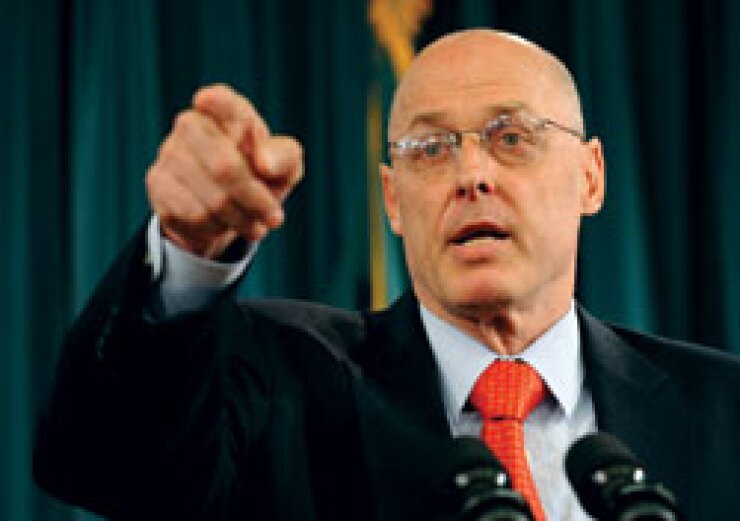
WASHINGTON - Treasury Secretary Henry Paulson yesterday threw cold water on the efforts of municipal market participants to convince the Treasury to purchase troubled state and local debt or to assist transit agencies facing millions in exposure to the beleaguered insurance giant American International Group Inc.
That is "not the focus of TARP," he said at a morning press conference, referring to the $700 billion Troubled Asset Relief Program. "The focus of TARP, as you know, is to stabilize financial institutions and strengthen the financial system for both lending and so on."
Paulson's comments on the municipal market came in response to a reporter's question and followed prepared remarks in which he said that the financial system was "stronger and more stable than just a few weeks ago." He said the Treasury's shift in tactics - buying equity stakes in lenders rather than their illiquid assets - provides "more leverage with taxpayer dollars" to heal the economy.
"The facts changed and the situation worsened," Paulson said. "Given the situation we confronted, we said the right way to use the taxpayers' money would be through an investment program. It's much more powerful."
The decision not to purchase troubled assets drew criticism from Tim Ryan, the president and chief executive officer of the Securities Industry and Financial Markets Association, who said he is "disappointed" by the Treasury's shift.
"Based on my experience with the Resolution Trust Corp., I believe a key ingredient to a strong recovery is the creation of price discovery" though a purchase program, Ryan said in a statement. He added that until price discovery for illiquid assets is achieved, "uncertainty could keep many financial players on the sidelines, restricting lending capital for the larger economy."
While muni market participants were disappointed that Paulson appeared to rule out Treasury using TARP to assist state and local governments - and 31 transit agencies - they cheered a separate announcement that Treasury is working with the Federal Reserve to develop a liquidity facility for asset-backed securities backed by car loans, credit cards, and student loans.
The facility will provide liquidity only to triple-A rated ABS, Paulson said, adding that it comes after lending in the primary ABS market has "come to a halt."
Paulson said he hopes the liquidity facility will encourage private investors to buy ABS again, though it may take "weeks" to implement the facility.
"These things are complicated and they're not easy to get up and going and to have work smoothly ... so this will take weeks to design and then it will take longer to get up and going," he said. "This is something that could be significant in size and would really need to be significant in size to make a difference."
Michael Decker, co-chief executive officer of the Regional Bond Dealers Association, said that the liquidity facility Paulson envisions would likely help issuers of both taxable and tax-exempt student loan asset-backed securities.
The development of the liquidity facility comes two weeks after the RBDA and the Education Finance Council sent a joint letter to the Treasury saying it should provide standby liquidity facilities for issuers still trying to convert from auction-rate securities to variable-rate demand obligations.
Specifically, the letter urged Treasury to consider providing a liquidity backstop for VRDOs under their authority to purchase or commit to purchase "troubled assets" under the TARP legislation. Alternatively, Treasury could use authority in the legislation allowing it to guarantee troubled assets issued prior to March 14, the letter said.
Though Decker said he did not hear Paulson's remarks on muni access to TARP, he noted that much of the muni market is not functioning normally and that market turmoil has forced issuers to delay nearly $100 billion of municipal borrowing because conditions are so unfavorable.
"If Treasury is focused on thawing the credit markets and getting credit flowing to worthy borrowers - which is the stated mission of TARP - then we think there's opportunities for them to engage themselves in the municipal market to that end," he said.
Issuers said that the municipal market should be treated equally with the corporate debt market and that they would continue to petition federal regulators.
Roger Anderson, executive director of the New Jersey Educational Facilities Authority, said issuers would continue to seek access to the Federal Reserve's Commercial Paper Funding Facility or a comparable program. Some issuer groups, such as the National Association of Counties, have turned to Congress for help - urging lawmakers for infrastructure aid in future stimulus legislation.
But in his remarks yesterday, Paulson stressed that he was focused solely on banking and other financial institutions.
"My focus is on the financial sector - getting credit going and getting lending going," he said. "I can't imagine that anything else would have a more stimulative impact."
Paulson briefly addressed some reforms that are needed for economic stability. He said credit rating agencies, among other market elements, need greater oversight. And with just nine weeks left in his term, Paulson said he spoke on Monday with the chief of President-elect Barack Obama's economic transition team and another Obama official to discuss the transition.
"I am totally dedicated to a seamless transition," Paulson said.
Andrew Ackerman contributed to this story.





